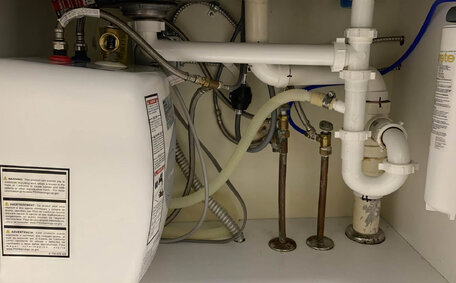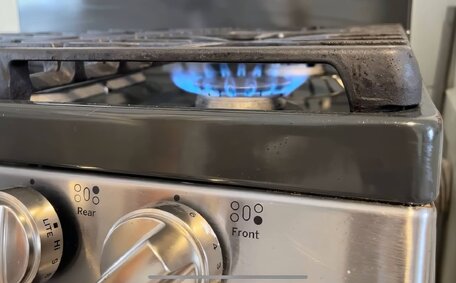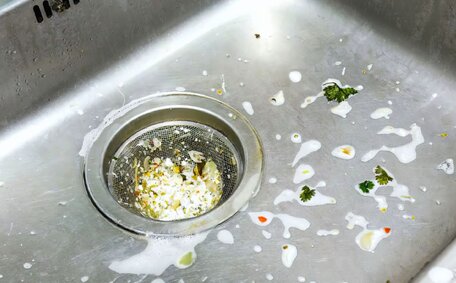What is Hard Water and Why is it Problematic for Plumbing?
Hard water contains elevated calcium and magnesium levels, which can lead to plumbing issues. Calcium and magnesium, occurring naturally, are the culprits behind water hardness, potentially leading to significant plumbing issues over time.
When hard water travels through your plumbing system, minerals bond to form scale deposits, posing a challenge for pipes, fixtures, and appliances. This mineral buildup clogs pipes over time, reducing water flow and pressure within your plumbing. Scale deposits, which illustrate hard water how it affects appliances, also reduce the efficiency and lifespan of your hot water system, washing machines, and other water-based devices.
Water hardness, measured in grains per gallon, creates resistant scale deposits that can lead to system failure and expensive repairs. Utilising water softeners and descaling methods are crucial for mitigating the effects of hard water on your plumbing system and appliances.
In essence, hard water poses significant consequences for both residential and commercial plumbing systems. Accumulated scale from hard water constricts water flow, strains pipes and seals, coats equipment, and reduces appliance longevity. This article provides crucial solutions for hard water issues afflicting plumbing systems in homes.
Signs Your Plumbing is Impacted by Hard Water Buildup
There are several clear signs hard water buildup is affecting your plumbing system:
- White or grey limescale buildup on sinks, bathtubs, shower heads, and other surfaces
- Reduced water flow from your faucets and shower heads is often due to mineral buildup inside your pipes
- Frequent clogging of pipes, leading to reduced water pressure
- Scale accumulation inside your appliances such as your dishwasher, washing machines, and water heaters, which undermines their efficiency
- Noisy pipes and plumbing fixtures, a problem does hard water can also result in
- Higher water bills adding to your utility costs
Hard water’s impact becomes evident as mineral coatings form inside pipes and on appliances. Gradually, water affects your entire plumbing network through scale buildup, leading to substantial issues.
Using a water softener as a preventative measure can help reduce hard water damage. We’ll explore various solutions coming up.
Clogged Drains and Pipes
One of the biggest plumbing headaches caused by hard water is clogged drains and pipes. As hard water travels through the plumbing system, minerals accumulate on the interior walls of pipes and drains. Over time, mineral scale from hard water can constrict and impair your pipes.
Scale deposits from hard water can completely block pipes and damage drain lines, resulting in backed-up sinks, improperly draining bathtubs, gurgling noises, unpleasant odours, and potential flooding. Pipe and drain clogs from hard water also cause drops in water pressure and flow rate from faucets and shower heads.
If neglected long-term, extensive buildup in pipes, caused by hard water, can degrade the infrastructure and sewer lines. The costs to clear fully blocked drain lines or replace corroded pipes due to untreated hard water can be expensive.
To prevent clogging issues, it’s prudent to install water softening systems to remove hard minerals your water holds that could damage your pipes. Yearly pipe inspections and professional drain cleaning can avert significant clogs and prevent the detrimental effects of hard water. Proactive use of water softening solutions can alleviate hard water complications, preventing future problems.
Corroded Fixtures and Reduced Water Flow
Over time, hard water corrosion can damage metal components in plumbing systems. As mineral scale accumulates on fixtures, tapware, and pipes, water does eat away at the metal surfaces they’re made from.
Hard water accelerates corrosion, resulting in unsightly stains and pitting on faucets, shower heads, and other fixtures. More worryingly, the corrosion does hard water affect can leave the integrity of your metal piping infrastructure compromised.
Corroded pipes are more prone to leaks and bursts, which can damage your home with water damage, flooding, and costly repairs. Furthermore, corrosion from hard water buildup contributes to reduced water flow and pressure over time.
Mineral deposits constrict pipes, significantly slowing down water flow. Low water pressure can disrupt appliance performance and daily water usage. Addressing hard water corrosion and flow issues pose major motivations for homeowners and businesses to take action against long-term hard water damage.
Installing water softeners acts to protect your plumbing against corrosion and scale buildup that gradually reduces water pressure. Regular pipe inspections can extend the life of plumbing components by identifying potential damage before leaks and bursts occur.
The Effects of Hard Water Scale on Appliances and Systems
Scale buildup from hard water significantly impairs the efficiency and performance of household appliances and plumbing systems over the long term.
As layers of mineral build up, the components of your washing machine cannot operate properly. For instance, your household washing machine gets clogged from calcium and soap scum buildup. This, along with soap scum can prevent proper spinning and drainage, leading to musty smells and mildew.
Dishwashers also underperform due to hard water stains on dishes and interior components getting coated in scale. The spray arms can’t distribute water effectively to clean properly.
In particular, Hot water heaters suffer considerably from hard water scale. Higher water temperatures accelerate mineral deposit buildup inside the tank. Insulating mineral layers force heating elements to exert more energy, increasing power consumption.
Hard water scale reduces the lifespan of water heater tanks by corroding the metal and damaging seals. The average lifespan of 12-15 years can be halved due to scale buildup, necessitating earlier service repair or replacement.
Scale deposits inside pipes reduce water flow and pressure for the entire household. Narrowed pipes force your plumbing appliances to work harder with an inadequate water supply.
Installing water softeners is the most effective way to filter out the minerals in water your plumbing is affected by, protecting appliances from scale damage over time. Annual servicing and treating your water before it turns hard also mitigate the effects of hard water.
Increased Energy Use and Reduced Efficiency
Hard water scale buildup inside appliances and plumbing systems often leads to higher energy usage. As mineral deposits accumulate, appliances have to work harder to heat water properly and perform cleaning cycles.
Water treatment processes target scale in water heaters, which hampers efficient heating by forming an insulating layer. More energy is required to heat water sufficiently for household needs, a problem that hard water affects your plumbing with. Excessively scaled water heaters can use up to 40% more energy; contacting us for expert solutions is advisable.
Washing machines and dishwashers face similar efficiency issues from deposits hard water causes, interfering with cleaning mechanisms and draining functions.
Increased energy consumption leads to rising electricity bills, an unjust financial burden for homeowners. Hard water damage escalates not only repair and replacement costs but also inflates your monthly utility bills.
Installing water softeners is the most effective solution for preventing scale buildup that reduces system efficiency. Softened water can enhance appliance operation and reduce energy usage by as much as 30%, studies show.
Replacing old appliances with hardened mineral deposits can provide major efficiency gains too. Newer energy-efficient models better resist scale buildup as well.
Taking steps within your home can help address hard water problems, vital for low appliance energy use and saving homeowners money every month.
How to Address Hard Water Problems
There are several effective solutions homeowners can implement to tackle hard water problems:
Install a Water Softener
Water softeners are the most reliable way to protect against buildup your plumbing systems and appliances face from hard water damage, ultimately improving water quality. Water softeners employ ion exchange to decrease mineral content, effectively mitigating water hardness.
In a water softener, calcium and magnesium ions from hard water are replaced with sodium ions, softening the water. This transforms the water from hard to soft, a property shift that won’t allow minerals to bind together and form scale deposits.
It’s important to review the range of water softeners on the market, as they can significantly affect your plumbing:
- Salt-based softeners - Widely used, these softeners apply sodium chloride to eliminate minerals
- Salt-free softeners - Use template assisted crystallisation (TAC) to condition water
- Magnetic/catalytic softeners - Magnetic or electric fields to suspend minerals without removing them
- Dual tank softeners - Allow for uninterrupted water flow during regeneration cycles
Consider factors like household size, plumbing system size, water usage levels and salt consumption to choose the right softener.
Use Scale Inhibitors
For mild hard water issues, scale inhibitors provide an affordable alternative to a full water softener system. They work by binding to calcium and magnesium ions, modifying crystal growth and stopping scale deposits from accumulating.
While not as comprehensive as softeners, scale inhibitors can still prevent hard water buildup and decelerate the scaling process. They’re simple to install on pipes or heating elements too.
Try Distillers or Filters
Water distillers completely remove minerals through evaporation, offering an effective filtration system, while filters like reverse osmosis isolate contaminants for removal. Both effectively soften hard water.
However, distillers and filters have a slower output, not always suitable for high household water demands. Often employed for the use water sees in day-to-day drinking water needs.
Perform Descaling Maintenance
Regular descaling helps eradicate minerals in your hard water already present in plumbing systems. Descalers efficiently get rid of scale deposits, allowing them to drain away cleanly.
Descaling should be done annually for water heaters, pipes and affected appliances to maximise efficiency and lifespan.
Discover more about hard water and how to fix burdensome conditions by selecting an appropriate solution for your specific circumstances. Proper installation and maintenance keeps plumbing systems performing optimally for years.






